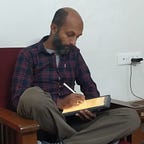Providence of God
Readings:
2 Chronicles 32: 9-23
Philippians 4:1-8
1 Peter 5:7-11
Gospel: Matthew 6:18-33
Paul, though imprisoned, encourages his readers, categorically, to not be anxious (Phil 4:8). He even dares them to rejoice! The temporary nature of their sufferings in the larger scheme of things offers a broader panoramic view of life.
In fact his closing words in Philippians chapter 4 is a call to not sit and brood or remain bitter feeling victimized. Instead he calls for counting or taking stock of (*logizomai*) about whatever is:
- True
- Pure
- Lovely
- Admirable
- Excellent
- Praiseworthy
The persecuted and scattered diaspora is reminder by Peter to cast their anxiety on God for he cares. The devil is a personified form of worries and mental turmoil that awaits to pounce on us in times of doubt and perceived uncertainty. In the minds of his audience, this imagery must have evoked the scene at the Roman Colosseum, where prisoners and offenders were offered to wild animals in a public stadium were people came to be entertained by this gruesome sport.
The words of Senacherib, King of Assyria are capable of sending chills down the spine of even the toughest people (2 Chronicles 32:9-23). His army and their positioning around the city made his hard words believable - as the only truth and the only possible way things could transpire. But the biblical narrative is a faith account of a small community that had little political standing or military might through most of history. They were a community of faith that relied solely on a covenant with God who revealed himself to them. This, for one, created much anxiety since they didn't seem to be doing what others were doing, and caused much “peer pressure” to conform to the ways and practices of their neighbouring cultures.
What happened to Senacherib and his army is narrated in a few words contrasted with the rather larger passage that consists of his threat and the description of their military posturing.
The story skips immediately to the next event in faith community's history, rendering Senacherib a mere blip in the their historical narrative. God remains and so do the people.
“Do not be anxious,“ is a statement that is rooted in multiple historical precedents. It is the historical experience and mental default for the community of faith.
It is in continuation with this community experience that Jesus Christ affirms not to be worried about what to eat and drink. The Lord provides ( Matthew 6:18-33).
Our call, then, is simply to seek first the Kingdom of God and the righteousness of God. And all of what we worry about will be provided. The message seems this : Take it easy. Let's get our priorities right. The rest is the Almighty God’s headache
